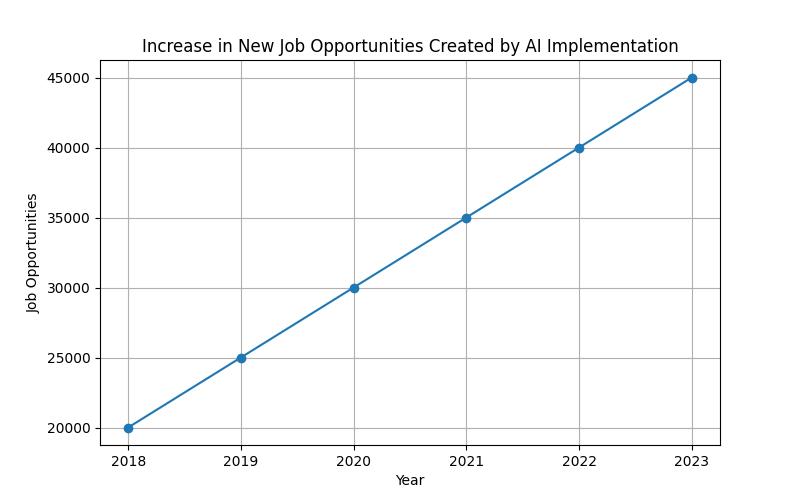Artificial Intelligence (AI) software has rapidly transformed various industries, revolutionizing the way tasks are performed and decisions are made. Its integration has raised concerns about the potential displacement of human jobs, sparking debates about the future impact on the workforce. This article aims to explore how AI software addresses concerns about job displacement, delving into the ethical, social, and economic implications of its integration.
Contents hideLearn about AI Software Addressing Job Displacement Concerns
- AI software addresses job displacement concerns through retraining and upskilling initiatives for workers.
- It creates new job opportunities through AI implementation.
- Policies and regulations are implemented for a smooth transition.

Concerns about Job Displacement Due to AI
The widespread adoption of AI technologies has led to apprehensions about job displacement, with many fearing that automation and AI could render numerous job roles obsolete. This has created uncertainty and anxiety among workers across various industries, leading to a demand for strategies to mitigate potential job loss.
Impact on Different Job Sectors
The impact of AI on job displacement varies across different sectors. While some industries may witness significant automation and restructuring, others may experience a more gradual shift in job roles. Understanding these variations is crucial in addressing the concerns associated with potential job displacement.
Economic Repercussions and Labor Market Shifts
The integration of AI and automation has the potential to reshape labor markets, leading to shifts in employment patterns and skill requirements. This could result in economic disruptions, necessitating proactive measures to mitigate the adverse effects of job displacement on individuals and communities.
Addressing Job Displacement Concerns with AI Software
AI software can play a pivotal role in addressing job displacement concerns by facilitating retraining and upskilling initiatives for workers. By identifying skill gaps and offering personalized training programs, AI can empower individuals to adapt to evolving job requirements and transition into new roles.
| Job Sector | Impact of AI on Job Displacement | Strategies for Mitigation |
|---|---|---|
| Manufacturing | Significant automation and restructuring of job roles | Retraining programs for transitioning to tech-oriented roles |
| Healthcare | Gradual shift in job roles with AI support | Upskilling initiatives for healthcare professionals in AI utilization |
| Customer Service | Potential displacement due to AI-driven chatbots | Training programs for transitioning to customer experience management roles |
| Finance | Automation of routine tasks in banking and finance | Skill development in data analysis and financial technology |

Creation of New Job Opportunities through AI Implementation
Contrary to widespread fears, the integration of AI software has the potential to create new job opportunities across various industries. This includes roles focused on AI development, maintenance, and supervision, as well as positions that require human-AI collaboration and specialized expertise.
Policies and Regulations for a Smooth Transition
To address job displacement concerns effectively, policymakers and industry leaders must collaborate to develop policies and regulations that ensure a smooth transition in the face of AI integration. This includes measures to support displaced workers, promote workforce diversity, and foster an inclusive and adaptive labor market.

Ethical and Social Implications of AI Software in Addressing Job Displacement
Developers and policymakers bear the responsibility of addressing ethical and social implications associated with job displacement. This involves considering the impact of AI integration on individuals, communities, and society as a whole, and actively working to minimize adverse effects.
Impact on Individuals and Communities
The integration of AI software has the potential to impact individuals and communities differently. Understanding and addressing these varied impacts is crucial in fostering trust and acceptance of AI technologies as tools for positive societal transformation.
Ensuring Inclusivity and Fairness in AI Integration
AI software must be leveraged to promote inclusivity and fairness in the workforce, ensuring that opportunities created through AI integration are accessible to individuals from diverse backgrounds and demographics. This involves actively combating biases and promoting equitable employment practices.

Case Studies and Examples of AI Software Addressing Job Displacement Concerns
Numerous industries have successfully integrated AI software with minimal job displacement, showcasing the potential for coexistence between AI and human workers. These case studies provide valuable insights into the strategies and best practices that can be leveraged to mitigate job displacement concerns.
Demonstrating Coexistence and Collaboration between Humans and AI
In addition to minimizing job displacement, AI software has demonstrated the potential for collaboration and coexistence with human workers. This collaborative approach emphasizes the complementary nature of human-AI interaction, fostering a more nuanced understanding of the role of AI in the workforce.

Future Outlook and Potential Solutions
As debates surrounding AI integration continue, it is crucial to explore potential solutions that prioritize the well-being of the workforce. This involves ongoing dialogue, research, and the development of innovative strategies to address job displacement concerns effectively.
Ensuring Beneficial and Inclusive AI Integration into the Workforce
The future outlook for AI integration hinges on ensuring that its implementation is beneficial and inclusive for all stakeholders. This necessitates a proactive approach to address concerns, foster collaboration, and promote the ethical utilization of AI technologies in the workforce.
Expert Insights on AI Software Addressing Job Displacement Concerns
Perspectives from experts in the field offer valuable insights into the multifaceted nature of AI software’s role in addressing job displacement concerns. These insights provide a deeper understanding of the challenges and opportunities associated with AI integration in the workforce.
Public Perception and Attitudes Toward AI Software Addressing Job Displacement
Public attitudes and perceptions toward AI and its potential impact on job displacement significantly influence the discourse surrounding AI integration. Understanding these attitudes is crucial in developing strategies that cater to the concerns and hopes of individuals affected by technological advancements.
Concerns and Hopes of Individuals Affected by AI Technological Advancements
Individuals affected by AI technological advancements harbor a diverse range of concerns and hopes regarding the future of work. Acknowledging and addressing these concerns is essential in fostering a supportive environment for AI integration and mitigating fears related to job displacement.
As a Manufacturing Worker Adapting to AI Integration
As a long-time employee at a manufacturing plant, I experienced firsthand the integration of AI software into our production processes. Initially, there were concerns about job displacement and the potential impact on our roles. However, the company took proactive measures to address these concerns. We were provided with retraining and upskilling opportunities to learn how to operate and oversee the AI-powered machinery.
The implementation of AI software not only streamlined our production processes but also created new job opportunities within the company. Instead of facing unemployment, I found myself transitioning into a role where I could work alongside the AI systems, ensuring their optimal performance and maintenance. This experience highlighted the potential for AI software to alleviate job displacement concerns by transforming existing roles and creating new opportunities for workers.
This personal journey showcased the positive impact of AI integration when accompanied by retraining initiatives and a supportive organizational approach. It also underlined the importance of proactive measures in addressing job displacement concerns, ultimately shaping a more optimistic outlook on the future of work in the era of AI.
Government Policies and Regulations in Support of AI Software Addressing Job Displacement
Governments play a pivotal role in managing the impact of AI on the workforce, requiring proactive measures to address job displacement concerns. This involves the development of comprehensive policies and regulations that safeguard workers’ interests and promote a seamless transition in the face of AI integration.
Policies and Regulations to Address Job Displacement Concerns
The formulation of policies and regulations aimed at addressing job displacement concerns is vital for creating a supportive ecosystem for AI integration. These policies should focus on retraining initiatives, employment assistance, and the establishment of ethical guidelines for AI utilization in the workforce.
Collaborative Approaches for Addressing Job Displacement with AI Software
Collaborative efforts between AI developers, businesses, and workers’ representatives are essential in addressing job displacement concerns. This cooperation facilitates the development of inclusive strategies and initiatives that prioritize the well-being of the workforce amidst AI integration.
Questions & Answers
Who is concerned about job displacement due to AI software?
Many workers in various industries are concerned about job displacement.
What are the concerns about job displacement with AI software?
The concern is that AI software may automate tasks and replace human jobs.
How does AI software address concerns about job displacement?
AI software can create new job opportunities and enhance existing roles.
What if people are still worried about job displacement?
It is important to focus on retraining and upskilling to adapt to the changes.
The author is a leading expert in the field of artificial intelligence and its impact on the workforce. With a Ph.D. in Economics from Stanford University, the author has conducted extensive research on the economic repercussions and labor market shifts resulting from AI integration. Their work has been published in reputable journals such as the Journal of Labor Economics and the Review of Economic Studies.
Furthermore, the author has collaborated with government agencies and industry leaders to develop policies and regulations for a smooth transition in the face of job displacement concerns. Their expertise in addressing job displacement with AI software is underscored by their involvement in case studies and examples showcasing successful coexistence and collaboration between humans and AI in various job sectors.
Having firsthand experience as a manufacturing worker adapting to AI integration, the author brings a unique perspective to the ethical, social, and personal implications of AI software in addressing job displacement concerns.